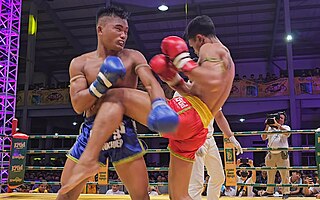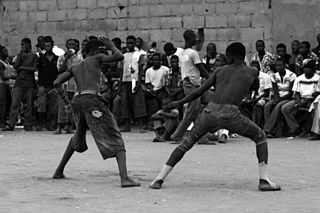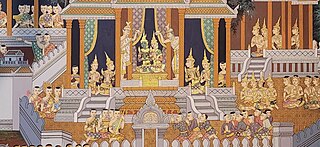
Martial arts are codified systems and traditions of combat practiced for a number of reasons such as self-defence; military and law enforcement applications; competition; physical, mental, and spiritual development; entertainment; and the preservation of a nation's intangible cultural heritage.

Although women have participated in boxing for almost as long as the sport has existed, female fights have been effectively outlawed for most of boxing's history until recently, with athletic commissioners refusing to sanction or issue licenses to women boxers, and most nations officially banning the sport. Reports of women entering the ring go back to the 18th century.

The culture of Indonesia has been shaped by the interplay of indigenous customs and diverse foreign influences. With over 1,300 distinct ethnic groups, including significant Austronesian and Melanesian cultures, contributing to its rich traditions, languages, and customs, Indonesia is a melting pot of diversity. Positioned along ancient trade routes between the Far East, South Asia, and the Middle East, the country has absorbed cultural practices influenced by Hinduism, Buddhism, Confucianism, Islam, and Christianity. These influences have created a complex cultural tapestry that often differs from the original indigenous cultures.

David Matthew Hicks is an Australian who attended al-Qaeda's Al Farouq training camp in Afghanistan. Hicks traveled to Pakistan after converting to Islam to learn more about the faith, eventually leading to his time in the training camp. He alleges that he was unfamiliar with al-Qaeda and had no idea that they targeted civilians. Hicks met with Osama bin Laden in 2001.

Kun Khmer, or Pradal Serey, is a combat sport that originated in Cambodia. The sport consists of stand up striking and clinch fighting, where the objective is to knock an opponent out, force a technical knockout, or win a match by points. The sport was codified in Cambodia by the French colonial administration in the early 20th century, and was derived from centuries-old traditions, namely Bokator, the close-quarter combat system used during the Khmer empire. The official Khmer name of the sport is Kbach Kun Pradal Khmer.

Anthony Steven Mundine is an Australian former professional boxer and rugby league footballer. In boxing he competed from 2000 to 2021, and held the WBA super-middleweight title twice between 2003 and 2008. He also held the IBO middleweight title from 2009 to 2010, and the WBA interim super-welterweight title from 2011 to 2012. Mundine is well known for his heated rivalries with fellow Australians Danny Green and Daniel Geale.

Sports in the Philippines is an important part of the country's culture. There are six major sports in the Philippines: basketball, boxing, tennis, football, billiards, and volleyball.

Sports in Indonesia are popular from both the participation and spectating aspect. Some popular sports in Indonesia are football, futsal, basketball, volleyball, badminton, and the native Indonesian martial art pencak silat. Badminton is arguably Indonesia's most successful sport. Indonesia has won gold medals in badminton in every Olympic Games since the sport was first introduced to the Olympics in 1992, with the exception of two, at the 2012 and 2024 Summer Olympics, although in latter Games, Indonesia clinched a gold medal for the first time in sport climbing and weightlifting, respectively. Indonesia became the first grand winner in Badminton Olympics back then 1992. Indonesia regularly participates in the Thomas Cup, Uber Cup, and Sudirman Cup badminton championships, then became the first nation in history to complete those three titles. Indonesia also regularly participates in regional multi-events sport, such as the Southeast Asian Games, Asian Games, and Olympic Games. Indonesia is one of the major sport powerhouses in the Southeast Asian region, winning the Southeast Asian Games 10 times since 1977.

Ancient Greek boxing dates back to at least the 8th century BC, and was practiced in a variety of social contexts in different Greek city-states. Most extant sources about ancient Greek boxing are fragmentary or legendary, making it difficult to reconstruct the rules, customs and history surrounding this activity in great detail. Still, it is clear that gloved boxing bouts were a significant part of ancient Greek athletic culture throughout the early classical period.

Whipcracking is the act of producing a cracking sound through the use of a whip. Used during livestock driving and horse riding, it has also become an art. A rhythmic whipcracking belongs to the traditional culture among various Germanic peoples of Bavaria, various Alpine areas, Austria, and Hungary (Ostorozás). Today it is a performing art, a part of rodeo show in United States, a competitive sport in Australia and increasingly popular in the United Kingdom, where it crosses boundaries of sport, hobby and performance.

Dambe is a martial art of the Hausa people from Nigeria. Competitors in a typical match aim to subdue each other into total submission mostly within three rounds. It often results in serious bodily injury. Boxers are called by the Hausa word "daæmaænga".

Cambodia has increasingly become involved in sports over the last 30 years.

The Manggarai are an ethnic group found in western Flores in the East Nusa Tenggara province, Indonesia. Manggarai people are spread across three regencies in the province, namely the West Manggarai Regency, Manggarai Regency, and East Manggarai Regency.
Fiona Smith is an Australian whip maker and competitive whipcracker. She is best known as the 12-time Australian ladies whipcracking champion, but has also won more than thirty other titles in local and national competition. Internationally, she won all three disciplines in an open competition organised by the Wild West Arts Club and held in Las Vegas, Nevada. She did so each time she entered.

At the 2010 Winter Paralympics in Vancouver, British Columbia, Canada, Australia sent 11 athletes to compete against the other participating 42 nations. The delegation consisted of 3 sighted guides and 17 support staff. This was the largest delegation Australia had sent to a Winter Paralympics. Australia has participated in every winter Paralympics since its conception.

Sydney Uni Boxing Club (SUBxC), established in 1908, is the University of Sydney's boxing club. Prior to 1908, the Club existed as a division of Sydney University Athletics Club. SUBxC is a founding member of the NSW Amateur Boxing Association (NSW ABA, known also as Boxing NSW), and is currently a member club of Sydney Uni Sport and Fitness, where it conducts all levels of boxing training at the dedicated facilities of the University Sports & Aquatic Centre. Historically, the Club has competed against other Australian universities, as well as teams from the Australian military.

Karapan sapi is a traditional bull racing festival on the Indonesian island of Madura. Every year from about July through October, local bulls are yoked to wooden skids and raced for 130 meters (430 ft), similar to a chariot race. These races are held in several places throughout the season, and a final trophy race held in Pamekasan. The bulls participating in the event are adorned with gold and other decorations, and the event is sometimes accompanied by Gamelan music, food, and wagers on the outcome of the race. A depiction of the festival was featured on the reverse of the 100-rupiah coin for Indonesia from 1991 to 1998. An Indonesian stamp issued in 2009 also depicted the race, along with the Surabaya–Madura Bridge.

Indonesian martial arts includes a variety of fighting systems native to or developed in the archipelago of Indonesia, both the age-old traditional arts, and the more recently developed hybrid combatives. In the Indonesian language the term bela-diri is used to mean martial art, and in essence the Indonesian fighting arts are meant as one's defence against perceived threat and assault. Other than physical training, they often include spiritual aspects to cultivate inner strength, inner peace and higher psychological ends.

Organized horse fighting is a blood sport between two stallions which is organized for the purposes of betting or entertainment. Although combat between horses occurs naturally in the wild, death or serious injury in naturally occurring animal fights is almost always avoided by ritualized behaviours or the withdrawal of one of the combatants.

Caci is a form of fighting with a whip or stick. It appears to be indigenous to Flores in East Nusa Tenggara, but it is also practiced in neighboring islands of Bali and Lombok, Indonesia. The art is sometimes called cacing or ende in Flores, and larik or kebat in Riung, while in Balinese it is known as ende.



















